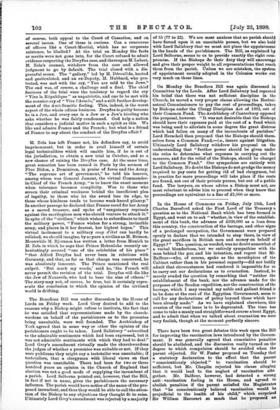On Monday the Benefices Bill was again discussed in Committee
by the Lords. After Lord Salisbury had repeated his belief that there was not sufficient discipline in the Church, he moved a very proper clause allowing the Ecclesi- astical Commissioners to pay the coat of proceedings, taken by Bishops under the Clergy Discipline Act of 1892, out of their Common Fund. The Archbishop of Canterbury opposed the proposal, however. "It was not desirable that the Bishops should have their expenses paid at the cost of s. fund which was being used to alleviate in some degree the great distress which had fallen on many of the incumbents of parishes." Lord Herschell then proposed that the Bishops should them. selves form a Common Fund,—i.e., insure against litigation. Ultimately Lord Salisbury withdrew his proposal on the understanding that "further power should be given under the rules to determine what expenses in carrying out the measure, and for the relief of the Bishops, should be charged to the Common Fund." Our sympathies are entirely with Lord Salisbury. No doubt the Bishops do not grudge the money required to pay costs for getting rid of bad clergymen, but in practice far more proceedings will take place if the costs are found, not out of their private purses, but out of a public fund. The lawyers, on whose advice a Bishop must act, are most reluctant to advise him to proceed when they know that proceedings are equivalent to a fine of 21,000 or more.


































 Previous page
Previous page